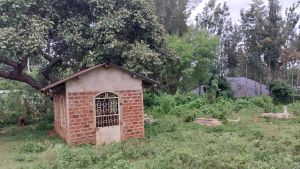Otieno's story
On a Monday, we conduct an intake with a new patient. The patient is a young man named Otieno, who is in the process of building a house on a mountain, although the walls are only partially constructed. He resides next door in a small room made of iron sheets. The space is just large enough to fit a bed crosswise, along with a cupboard and a bench. He is lying on the bed and greets us warmly. At thirty years old, he is the father of two children. In addition to living with AIDS, a topic he prefers to avoid due to shame, he is experiencing stomach issues. I struggle to fully grasp the situation as he discusses both his stomach and intestines. Eventually, it becomes clear that he has his discharge papers from the hospital, which we may find useful. Upon reading the documents, I am taken aback to discover that he has colon cancer. When I gently inquire further about what the doctor has communicated regarding his condition, he informs me that he has been prescribed medication to soften his stool, and he believes that everything will likely improve from there.
I let out a sigh internally. This seems to be yet another instance where the doctors have not informed them of the strong suspicion of cancer. A biopsy was performed, and the results are expected by the end of next week. They have also been referred to the oncology clinic, but it is likely that they are unaware of this and what it entails. I find myself sitting there, uncertain whether to speak up cautiously or to wait… Ultimately, I decide to inform him and his wife that they should expect the results next week and then proceed to the oncology clinic. For now, I choose to leave it at that. After all, isn’t it primarily the doctor’s responsibility to convey this information?
We urge him to adhere to his medication regimen diligently, stay hydrated, and occasionally spend time outdoors to enjoy sunlight and fresh air. We assure him that we will return next week.
As I walk back to the car with my colleague, I share the contents of the letter with her. She points out that this is a frequent occurrence; doctors, particularly in the state hospital, provide minimal information to their patients.
The following Monday, it is time to visit him once more. My colleague who was present last week is on leave for a few days, so along with two other colleagues, we head to Otieno. We park the car again, collect a food parcel, and prepare to walk to his house, but then we hear something. It is wailing, crying… The sound that women make when someone has passed away. We exchange glances, filled with despair, and wonder where this is coming from. My colleagues ask me if Otieno was so ill that he is the one who has died. I respond that he was unwell, but not to the extent that I would expect him to have died. However, an elderly grandmother also lived on his land; perhaps she has passed away?
Typically, I avoid visiting a location where someone has recently passed away, as I am aware of the implications. People assume that I will make a significant contribution to the funeral, which is precisely what I wish to evade. However, since I am the only one familiar with Otieno’s residence, I must accompany them now. We depart, still pondering who has died.
Upon our arrival, we see Otieno’s wife wandering through their garden, expressing her distress and weeping; it is clear to us… She has lost her husband.
She notices our arrival and relaxes slightly. We enter the house and take a seat. The garden is crowded with people, and I feel a sense of discomfort, as I already anticipate what is about to unfold. Otieno’s wife enters and begins recounting how, the day before, he suddenly fell gravely ill, called for his sister and children, and spoke with them. An hour later, to everyone’s astonishment, he passed away. Once she concludes her narrative, a sister-in-law arrives, and as she settles in, the inquiries begin, asking if I can assist the children with school and if I am willing to help them complete the house. According to the customs of this tribe, a man can only be buried if his wife and children have a home. However, upon observing the progress of the construction, it is evident that a significant amount of money is still required to finish it! I promptly clarify that we do not engage in this and that our focus is solely on caring for the sick. Once they pass away, to put it bluntly, our work is concluded. They comprehend, yet they make a few more attempts, while at least ten individuals stand at the door, listening intently.
We conclude with a message of encouragement from my colleague, who also became a young widow. She prays for Otieno’s wife and her children. We leave the food parcel behind and depart once more. There is a sense of quiet among us, as we reflect on the life of Otieno and the unexpected death… It is not what you hope for.


